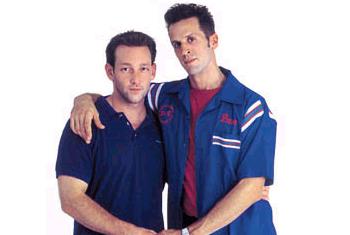“Love you.”
“Mean it.”
When we think of gay-themed films, we picture San Francisco, New York, Montreal maybe, but Winnipeg? Lost in the big flat middle of Canada, the Manitoba capital calls to mind country bars, World Curling Championships and hog farms, but thriving sexual and cultural diversity? Hardly.
Still, it’s home to David (Troy Ruptash from “M.V.P. II: Most Vertical Primate”), a rich and famous homosexual painter who decides to get a job as waiter to reconnect with the world and retrieve inspiration. He’s hired by Matt (Vincent Corazza) and Violet (Cherilee Taylor), a married couple who run a small diner. Things get more complicated when David falls in love with the husband and, to the surprise of them both, discovers that the attraction is mutual…
“Leaving Metropolis” is the directorial debut of playwright Brad Fraser, who previously wrote the Genie-winning screenplay for “Love and Human Remains”. Fraser is once again adapting one of his plays, “Poor Superman”, to mixed results. Fraser has a good ear for dialogue but the plot twists are rather contrived and the film gets ridiculously melodramatic at times. Did David’s roommate (Thom Allison) have to be not only a transsexual waiting for his/her gender reassignment operation but also HIV positive AND suffering of brain cancer? Was it necessary to give their “fag hag” columnist girlfriend (Lynda Boyd) a subplot about failed Internet dating and alcoholism?
The premise itself was problematic to me. Isn’t David just a homewrecker and Matt an adulterous jerk? It’s not like it’s true love, it seems like no more than two horny guys going at it without considering others’ feelings. Then there’s this whole TV-movie feel to the film that can be distracting, especially when it comes to the hammy performances. Fraser does pull a couple of interesting quasi-surreal sequences, yet in spite of this and all the nudity and crude talk, the picture remains so… Canadian. Polite, timid, proper… Even when the characters are cursing it sounds nice!
And about the title? It has something to do with the film, barely. The story apparently takes place in the early ‘90s when D.C. pushed comic books in mainstream consciousness again by staging a series of big events around Superman: Clark proposing to Lois Lane, then finally revealing who he really is and, of course, his death in “Superman #75”. Much is made in “Leaving Metropolis” about how these things might relate to the characters’ lives, but it remains a superficial (if not unwelcome) gimmick.
“Leaving Metropolis” has its bright spots but they’re too few and far between for me to recommend it. I guess gay audiences will get more out of it than I did, if only to watch hunky men get it on, but for the rest this will only make the experience more awkward. You know in which camp you are.
“Mean you.”
“Love it.”

